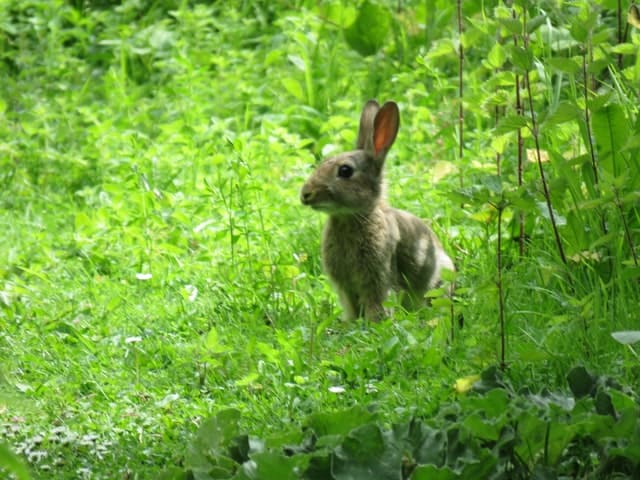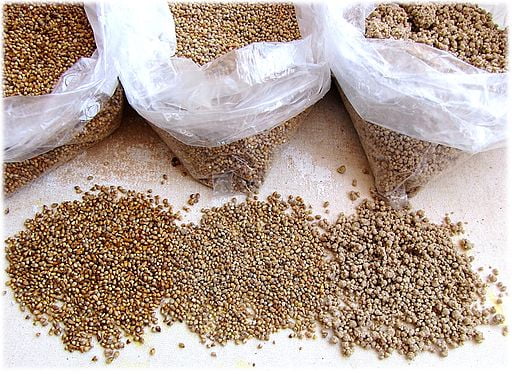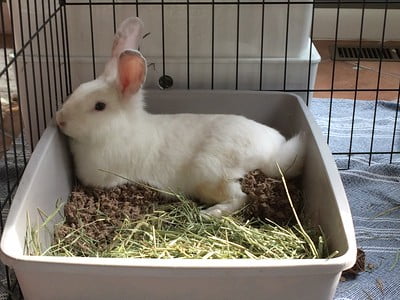Last Updated on February 24, 2023 by Marjon Ramos
Quick Facts About Cranberries:
- Scientific name – Vaccinium subg. Oxycoccus
- Origin – North America
- Most commonly found in – Peru, Spain, and the Netherlands.
Cranberries are one of the most recommended treats for rabbits. You can safely feed your rabbits small amounts of cranberries 1-2 times per week and make sure that your rabbit is at least 7 months old.
Also, be careful when introducing any new diet to your rabbit, especially if they are young. Always introduce it in small amounts at first to avoid triggering digestive problems.
Now that I’ve given you the gist of the article, read on as I explain in more detail why rabbits can eat cranberries:
Table of Contents
Do rabbits like to eat cranberries?
In my case, both of my rabbits (Tyr and Freya) like to eat cranberries whenever I give them some.
I’ve also asked several of my friends who are rabbit owners and breeders if they ever fed cranberries to their rabbits and if their rabbits liked cranberries.
All of them reported feeding cranberries occasionally and that their rabbits gobble up the cranberries immediately.
Are cranberries safe to be eaten by rabbits?
As long as your rabbit is at least 7 months old and you only feed it 1-2 times per week, feeding cranberries to your rabbit is perfectly safe.
The problem would most likely come when rabbit owners feed treats to young rabbits whose susceptible to digestive problems. Another possible way cranberries would harm your rabbit is if they are already obese.
Obese rabbits should not be fed sugary treats like cranberries until a normal weight is acquired.
Finally, cranberries, when fed regularly, could lead to dental problems because sugar damages teeth if fed long-term.
What are the benefits of feeding cranberries to rabbits?
To properly identify the benefits of feeding cranberries to your rabbits, let’s first take a look at what nutrients your rabbits are getting whenever you feed them cranberries.
We can use this nutrient constraint calculator, which shows the different nutrients your rabbit is getting and if the amount you’re giving is within the nutritional constraint.
You can also click on the blue icon beside the nutrient to show the different benefits and deficiencies of each nutrient:
Nutrient Constrain Calculator For Rabbits
Warning:
Although cranberries have these benefits, overfeeding your rabbit is not recommended. This is only to inform you of the different vitamins and minerals your rabbit can get when you give them cranberries.
As you can see from the nutrient constrain calculator above, 100 grams of cranberries contains very little nutrients.
But, as an occasional treat, it’s perfectly fine to have this low in nutrients because you should never rely on treats like cranberries to meet your rabbit’s nutritional needs.
Doing so could lead to obesity or digestive problems.
Are cranberries good for rabbits?
100 grams of cranberries contain small amounts of vitamins A, E, and B6. As well as copper, pantothenic acid, niacin, choline, protein, fiber, lysine, calcium, phosphorus, magnesium, and potassium.
All of which are great for rabbits and are still within the nutritional constraint for rabbits.
How many cranberries can a rabbit eat?
The proper amount of cranberries you should feed your rabbit would depend on their current weight and age.
You can use this nutrient constraint calculator to determine the amount of cranberries (treats) you should give your rabbits:
Diet Portion Calculator For Rabbits
If you currently have no idea what your rabbit’s weight is, here’s a table of the different weights of rabbit breeds and how much cranberries you can give:
| Rabbit’s weight based on breed | Allowed cranberries |
|---|---|
| Small breed (1.1–3.5 pounds) | 1 teaspoon |
| Medium breed (6 to 10 pounds) | 1-2 tablespoon |
| Large breed ( 9 and 12 pounds) | 2-3 tablespoon |
When can rabbits start eating cranberries?
The table above, which shows how many cranberries you can give your rabbit, assumes that your rabbit is at least 7 months old.
Another important factor when deciding how much cranberry to give your rabbits is their age.
Here’s a table that shows how much cranberries you can give your rabbit based on their age:
| Age | Fruits |
|---|---|
| 7 weeks to 7 months | — |
| 7 months to 1 year | No more than 1-2 oz (30-60g) per 6 lbs (2.7 kg) BW |
| Adult (1-5 y) | No more than 2 tbsp per 6 lbs (2.7 kg) BW |
| Seniors (>6 y) | Talk to your veterinarian for a more specialized diet. |
When should you not feed cranberries to rabbits?

Gist:
Do not feed cranberries to your rabbit if you suspect any digestive problems.
The proper protocol whenever you suspect or notice that your rabbit is having digestive problems is to remove any other food from their diet except hay. This is especially true for sugary treats like cranberries.
This would ensure that your rabbit is getting their required fiber for the day and is not eating cranberries in lieu of hay.
Finally, always bring your rabbits to a veterinarian whenever you notice signs of digestive problems, especially in young rabbits who are more susceptible to them.
Risk of overfeeding cranberries to rabbits.
While cranberries are safe and nutritious for rabbits, there are still risks associated with overfeeding your rabbits:
- Gastrointestinal Stasis: Overfeeding cranberries in lieu of hay to your rabbits could lead to GI stasis, which is caused by a lack of fiber in your rabbit’s diet.
- Diarrhea: Diarrhea is also possible when rabbit owners overfeed large amounts of cranberries to their rabbits too fast. Always introduce any new diet to your rabbits slowly.
- Uneaten cecotropes: Soft uneaten cecotropes are also possible when rabbits are eating large amounts of cranberries instead of hay. This could lead to softer cecotropes due to the lack of fiber.
- Dental problems: Due to the sugar content of cranberries, feeding your rabbits large amounts of them could lead to dental problems.
- Obesity: Overfeeding cranberries to older rabbits, whose metabolism is slower, could lead to obesity due to the high sugar content of cranberries. Obesity could also lead to uneaten cecotropes, or “poopy bottoms,” because obese rabbits wouldn’t be able to reach their cecotropes to eat them.
Healthy alternatives to cranberries.
While cranberries are a great treat for rabbits, you should still give your rabbits a variety of choices when it comes to their diet. Never feed one thing for a long period of time.
Here are some healthy alternatives to cranberries that you can give your rabbits 1-2 times per week:
FAQ (Frequently Asked Questions)
Can rabbits eat dried cranberries?
Yes, rabbits that are at least 7 months old can eat dried cranberries 1-2 times a week in moderate amounts.
Can rabbits have cranberry juice?
No, cranberry juice should never be given to rabbits because it’s often loaded with too much sugar. Doing so could lead to digestive and dental problems as well as obesity.
Conclusion
Cranberries can be given to rabbits that are at least 7 months old 1-2 times per week in small amounts. Just make sure that your rabbit is not eating cranberries in lieu of hay.
Also, older rabbits (6 years old or older) should follow their veterinarian’s advice when it comes to their diet. Most likely, your veterinarian would advise against feeding cranberries if your rabbit is overweight or to prevent it.
Cite this article:
Related Articles
- Can Rabbits Eat Asparagus? 9 things you need to know.
- Can Rabbits Eat Tomatoes? What You Need To Know.
- Can Rabbits Eat Watermelon? What You Need To Know.
- Can Rabbits Eat Grapes? What You Need To Know.
- Can Rabbits Eat Broccoli? What You Need To Know.
- Can Rabbits Eat Apples? What You Need To Know.
- Can Rabbits Eat Cabbages? What You Need To Know.
- Can Rabbits Eat Strawberries? What You Need To Know.
- Can Rabbits Eat Bananas? What You Need To Know.
- Can Rabbits Eat Oranges? 9 things you need to know.
- Can Rabbits Eat Blueberries? Here’s Why.
- Can Rabbits Eat Spinach? Your Questions Answered.
- Can Rabbits Eat Cucumbers? Here’s Why.
- Can Rabbits Eat Celery? What you need to know.
- Can Rabbits Eat Radishes: Everything You Need To Know
Sources
- Cranberries, raw
- Patry, Karen, et al. The Rabbit-Raising Problem Solver: Your Questions Answered about Housing, Feeding, Behavior, Health Care, Breeding, and Kindling. Storey Publishing, 2014.
- Digestive disorders
- Health Problems in Rabbits
- Obesity in Rabbits
- BSAVA Manual of Rabbit Medicine




